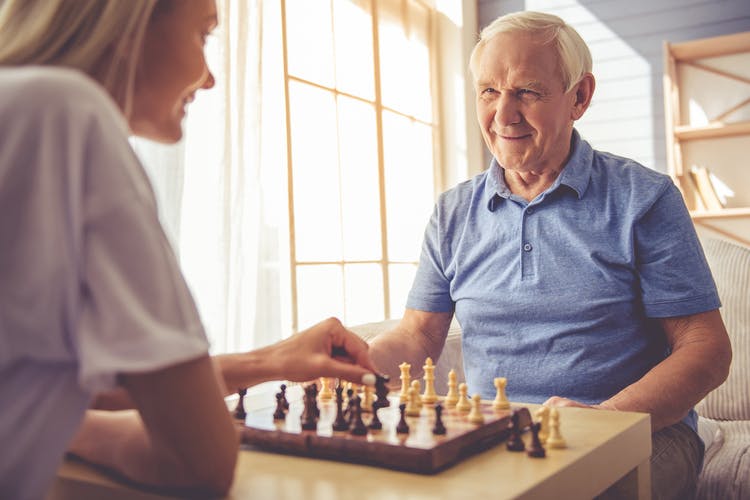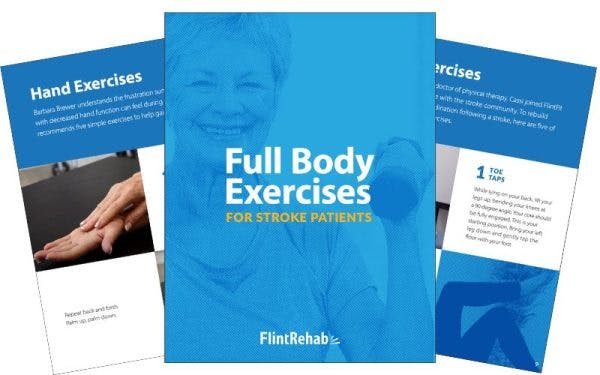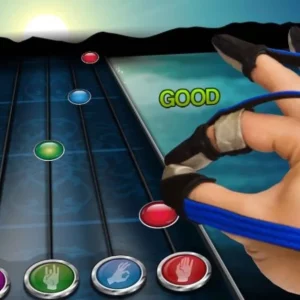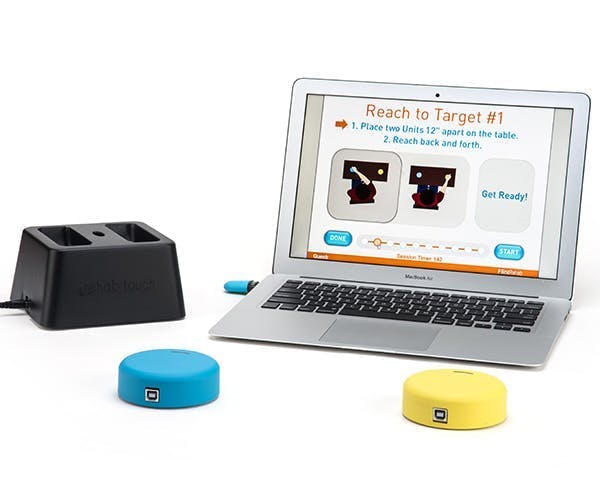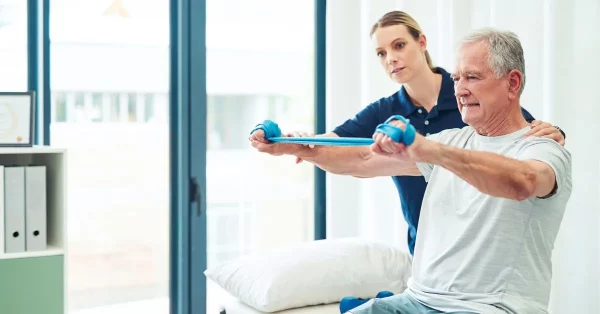While games can be enjoyable for individuals of every age, games for stroke patients can actually promote recovery. During rehabilitation, it is critical to stay active, both physically and mentally. While many individuals focus heavily on physical recovery, cognitive recovery can be equally as important.
Because such a wide variety of games have been developed, survivors can often find at least one game that targets the specific cognitive skills they are hoping to improve. Stimulating the brain through games can activate neuroplasticity, the brain’s natural repair mechanism. Therefore, repetitively practicing cognitive skills through games can allow survivors to regain and maintain functions that were impaired or lost after stroke.
This article provides an overview of many fun and challenging games that are ideal for improving cognitive function among stroke patients. These are organized by the types of cognitive skills addressed, with three difficulty levels provided in each category. Use the links below to jump directly to any section.
- Memory and attention games
- Games to improve processing speed
- Developing language skills through games
- Games for improving visual skills
- Further considerations
Memory and Attention Games
The cognitive skills of memory and attention are essential for playing almost any game. Long-term memories may be drawn upon when replaying a game that an individual had played in the past, while working memory is vital to learn and remember how new games are played. The skills of sustained and selective attention are also necessary to focus on game play and tune out any unrelated distractions.
Games that specifically address memory and attention include:
Beginner: Old Maid or Go Fish
These simple card games can be a great starting point for individuals whose memory and attention skills have been severely affected. Since these games are relatively quick, they require a limited amount of sustained attention. Short-term and working memory can also be challenged when trying to remember which players have which cards.
Intermediate: Concentration or Guess Who?
During the game of Concentration, survivors can challenge their working memory and sustained attention skills by try to pick two matching cards from a set of cards laid out on the table. Guess Who? can also address these skills, while also allowing individuals to work on mental organization and classification skills when grouping characters together by their similarities and differences.
Advanced: Clue or Azul
These more complex games can be used to fine-tune memory and attention skills, while also exercising reasoning and problem-solving abilities.
Learn more games to improve memory after stroke.
Improving Processing Speed through Games
Certain games for stroke patients can also help to increase processing speed. While individuals may require extra time to play these games initially, with practice, their processing speed may improve. Games that can help improve processing speed include:
Beginner: Dutch Blitz or Spoons
These fast-paced card games require skills such as pattern recognition and sequencing, as well as adequate fine motor skills to quickly grasp and manipulate the cards. Practicing these games independently before playing with more players can be an excellent way to gradually improve processing speed as well.
Intermediate: Perfection
This game, which involves placing uniquely shaped pieces into their matching holes before a timer goes off, can challenge both fine motor skills and processing speed. To begin with, individuals may choose to practice this game without the timer or use a stopwatch to see how fast they can place all of the pieces into their respective positions.
Advanced: Pictionary or Charades
Playing games during which individuals draw, act out, or describe a specific item can be a fun yet challenging way to work on improving processing speed. Since the individual depicting the targeted word is constantly adapting their presentation, survivors have to use rapid processing skills in order to provide accurate guesses.
Games that Promote Language Skills
The ability to express and comprehend language is frequently impaired after stroke. The following games may help survivors who experience communication challenges due to aphasia, apraxia of speech, or dysarthria.
Beginner: Boggle
Played by connecting adjacent letters to create words, Boggle is a great game for individuals targeting word-finding skills. Language expression skills can also be practiced by writing or verbally stating the words found in the game. Some survivors may also benefit from initially playing independently without any time constraints to create a low-pressure and enjoyable atmosphere.
Intermediate: Catch Phrase or Taboo
These fast-paced word games can challenge both receptive and expressive language skills as players race to guess which word the speaker is describing. Although against the official rules, players may choose to allow gestures to boost communication and even the playing field.
Advanced: Bananagrams or Scrabble
Both involving small letter tiles to create words, playing Bananagrams or Scrabble can be a great way to promote language skills and word-finding abilities. If trying to use the letters already in play to create words is too challenging, players can simply take 25 tiles and attempt to make as many words as possible.
Games Focused on Visual Skills
A stroke may affect vision, causing challenges such as visual field deficits or problems with visual attention. For example, individuals with hemianopia or hemineglect may be unable to see or perceive anything on one side of their body.
While most games involve at least some visual components, the games below can be particularly helpful for addressing visual skills.
Beginner: Connect 4 or Sequence
These games, which involve connecting multiple game chips in a row, column or on diagonal, can promote visual scanning skills and cognitive flexibility. Since Sequence is a little more complicated, it may be best to try Connect 4 before playing Sequence. Furthermore, some survivors may benefit from trying the “giant” versions of Connect 4 or Sequence to enhance visual awareness of a larger area and improve gross motor skills.
Intermediate: Spot It! or Blink
Card games, such as Spot It! or Blink, can exercise skills such as visual memory, visual discrimination, and visual scanning. While these games are designed to be fast-paced, slowing them down can make game play more enjoyable for survivors while they are improving.
Advanced: Battleship
This game can challenge visuospatial skills while also exercising reasoning and problem-solving abilities. Fine motor precision skills may also be challenged.
Considerations Regarding Games for Stroke Patients
While the list above provides a starting point for stroke survivors hoping to enhance their cognitive skills through games, it is by no means exhaustive. A speech or occupational therapist may be able to provide more personalized recommendations.
Finding a game that is appropriately challenging, yet still enjoyable, can sometimes be difficult. Many games have a junior or kid’s version, which may help survivors who need just a little more practice before trying the standard game. Alternatively, adding more players, time constraints, or external distractions can make games a little more challenging.
Survivors who are looking to fine-tune their cognitive skills may benefit from playing more advanced strategy games. These games often require intense concentration, long periods of sustained attention, and high-level problem-solving skills.
Example strategy games for stroke patients include:
- Carcassonne: a puzzle-based game that can challenge visuospatial skills and problem-solving
- Chess: a traditional game requiring planning, judgement and reasoning
- Catan: a building and trading game requiring constant cognitive flexibility and social skills
Finally, some survivors prefer to use gamified rehabilitation technology, such as the CT Speech and Cognitive Therapy App, FitMi, or the MusicGlove. These devices and programs can address cognitive and/or physical functions while adapting to the survivor’s skill level to provide a just-right challenge. By combining the motivational qualities of gaming with the therapeutic benefits of rehabilitation, survivors can get the best of both worlds.
Want to learn more about the CT Speech and Cognitive Therapy App? Get Started Here.
(Link opens a pop-up for uninterrupted reading.)
Finding the Best Games for Stroke Patients
Games can be an engaging option for improving cognitive skills after stroke and can help promote a faster and fuller recovery from stroke. Different games will engage different parts of the brain to target specific cognitive skills.
Therefore, it is important to choose games that will address the survivor’s targeted skills. Games can also be modified to offer an appropriate challenge without becoming overwhelming.
The best games for stroke patients will vary depending on the individual’s needs and skill level. However, games can be an excellent tool to use to boost motivation and brighten a survivor’s recovery journey.

